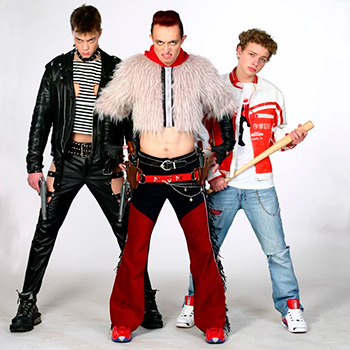

POR.NORAP (Pornorap, «Pornorap») is a Russian music group from Moscow that emerged in the early 2000s. The project became known for its provocative style, combining digital punk, trash rap, parody, satire and elements of horrorcore.
The band gained cult status thanks to viral tracks, a shocking aesthetic and deliberate absurdity turned into an artistic device.
Formation of the group
The project took shape in late 2003 in Moscow. The early line-up included:
-
Poh (Pavel Pavlyuchuk) — vocals, the face of the project;
-
Palych (Aleksandr Alyabyev) — one of the members and co-author of the early material;
-
Kosar — member of the first period.
From the very beginning the band had an unusual goal: to make music as a protest against boredom, political correctness and clichés. Their songs are grotesque, parody, exaggerated characters and deliberate provocation.
First period (2003–2006) — cult underground status
In the early 2000s POR.NORAP released their debut album «Pornorap», which included the band’s main hit — «Aty-baty».
The track went viral long before the age of social media: it was shared on burned CDs, via Bluetooth and shown to friends on mobile phones. It was during this period that the group earned a reputation as an «underground legend of the 2000s».
The second release followed — the album «Tema pelotki» («The Pussy Theme»), which cemented the band’s style and added new fan favourites such as «Novoye obshchestvo» («New Society»), «Marshrutka» («Minibus») and others.
Provocative humour, anti-glamour aesthetics, eccentric lyrics and a complete lack of censorship made POR.NORAP a project that was almost impossible to put on TV — but that only fuelled interest and built an aura of forbidden cult around the band.
By the mid-2000s the project almost ceased activity: the members went their separate ways, while the albums continued to live «among the people» without any official support.
Comeback (2017–2019) — a new generation of listeners
Years later POR.NORAP unexpectedly returned. Poh decided to revive the project in an updated form together with composer and producer Alex KZN (Alex Karazin).
The release «Bronetrusy» («Armored Panties») appeared — an album that many listeners perceive as the third main chapter in the band’s history. Here the sound became more electronic and modern, while keeping the trademark punk cheekiness and satirical delivery.
The band also returned to live shows and online platforms — including streaming services and social media.
Modern era (2020s)
In the 2020s POR.NORAP have been actively releasing new albums and singles, focusing more on digital punk and electronic trash rap.
Key works of recent years include:
-
«Deyaniya slavneyshikh» («Deeds of the Glorious») — a conceptual album satirising society and subcultures;
-
«Posledniy Albom» («The Last Album») — a collection that mixes new tracks with live versions and reworked material;
-
remakes of early classics («Novoye obshchestvo 2021», «Volya — the continuation of "Aty-baty"»).
New members have gradually joined the project. Among them is Ekler, who appeared in the 2020s and became part of the current line-up.
POR.NORAP remain experimenters: they can switch genres, poke fun at themselves and play with form — but they always keep their signature sharp, satirical tone.
Style and characteristics
The sound of POR.NORAP can be described as a unique blend of:
-
digital punk
-
parody / mock-rap
-
trash comedy
-
horror aesthetics
-
aggressive spoken-word rap
The core idea is absurdity as art, grotesque as a creative method.
The band deliberately exaggerates everything: from characters to social topics. No taboos, no censorship, shock value and self-irony — this is what makes POR.NORAP unique.
Most famous tracks
-
«Aty-baty» — the main hit and «calling card» of the group;
-
«Novoye obshchestvo» («New Society»);
-
«Marshrutka» («Minibus»);
-
«Kusok myasa» («Piece of Meat»);
-
«Paranoyya 2020» («Paranoia 2020»);
-
«Tsar 2042»;
-
«Ya godnoye lukoshko» («I’m a Fine Little Basket»);
-
«Bankrot» («Bankrupt»);
-
«Sektant» («Cultist»);
-
«Krovavyy tsirk» («Bloody Circus»).
Also noteworthy is the collaboration «Blago» with dark electronic project Otto Dix — a rare but significant joint work.
Interesting facts
-
In the 2000s the track «Aty-baty» became one of the first truly «viral» songs outside of television — it spread via mobile phones, burned CDs and local forums.
-
The band never aimed for mainstream airplay, considering the underground to be their natural environment.
-
In real life the members are much calmer and more level-headed than their on-stage personas — the brutality, trash and aggression are theatrical devices.
-
POR.NORAP call themselves «digital punks» and emphasise that all the extremity in their lyrics is artistic grotesque, not a literal reflection of their views.
-
Poh has a very distinctive delivery style — a mix of punk vocals, rap-like recitative and deliberately caricatured intonation.
-
The band’s songs often contain hidden social commentary beneath layers of trash and humour.
Conclusion
POR.NORAP are more than just a trash-rap act. They are a phenomenon that has gone from an underground viral curiosity to an original digital punk band for a new generation.
The project has managed to preserve the spirit of the 2000s, refresh its sound, win back old fans and attract a new audience. POR.NORAP remain an example of how radical humour, absurdity and daring satire can grow into a unique musical direction with its own philosophy and culture.







